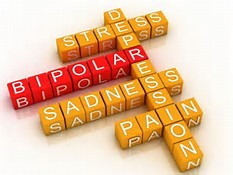 Life Insurance with Bipolar Disorder
Life Insurance with Bipolar Disorder
According to the National Institute of Mental Health, roughly 5.7 million people in the United States suffer from bipolar disorder. Bipolar disorder can be a debilitating mental health issue if left untreated. But for those who are being treated for bipolar disorder, it can mean a normal, productive life. If you are looking for life insurance with bipolar disorder, you will be happy to know that affordable coverage is available in many cases. Your final health rating will depend on a number of factors surrounding the severity of your particular situation. In this post we will discuss what factors life insurance companies focus on when assessing applicants with bipolar disorder and what rating you can expect for life insurance with bipolar disorder.
What is Bipolar Disorder?
Bipolar disorder, once termed manic-depressive illness, is a brain disorder that causes unusual shifts in mood, energy, activity levels, and the ability to carry out day-to-day tasks. Symptoms of bipolar disorder are characterized by severe mood swings that alternate from periods of severe highs (mania) to extreme lows (depression). People who suffer from bipolar disorder tend to perform poorly at work, have difficulty maintaining relationships and suffer from physical health issues. Suicide is the number one cause of premature death among people with untreated bipolar disorder.
How Life Insurance Companies View Bipolar Disorder
In most cases, life insurance companies are going to classify your particular bipolar disorder into one of three categories – mild, moderate or severe.
Mild Bipolar Disorder – Bipolar disorder is considered mild if you have stable symptoms (no missed work, no hospitalizations and no attempted suicides) that are well controlled with the use of medication or psychotherapy. Most people who have mild bipolar disorder will usually qualify for ‘Standard’ to ‘Table 2’ health ratings. In certain cases where you have been episode free for many years and your bipolar disorder has not impacted your life whatsoever, you might even be able to qualify for ‘Preferred’ rates.
Moderate Bipolar Disorder – Bipolar is considered moderate if you’ve had one or more episodes in the past but have responded well to treatment. The past 2 years should be clear of hospital stays or suicide attempts as well. Most people who fall into the moderate category will most likely be considered ‘Table 3’ to ‘Table 8’ rating.
Severe Bipolar Disorder – Bipolar disorder is considered severe if your life is severely disrupted by your condition. This is characterized by missing long periods of time at work, frequent hospitalizations or multiple suicide attempts. Most people who fall into the severe category will likely be ‘Table 8’ to ‘decline’.
These are simply guidelines. Your actual health rating will depend on the specifics of your situation. If you would like to have a better idea of what your health rating could be, give us the specifics of your situation and we will field some tentative offers for you. This will give you an idea of what you’re up against before even filling out an application.
What Life Insurance Companies Need to Know About Your Bipolar Disorder?
You can be assured that all life insurance companies will want to review your medical records if you are applying for life insurance with bipolar disorder. They are going to be interested in knowing the following about your specific situation with regards to bipolar disorder:
- Your date and description of diagnosis
- Details of treatment such as medication or psychotherapy
- History of episodes and any trigger events
- History of any hospitalizations and suicide attempts
- History of lost time at work or other issues in performing regular daily activities
- Progress of current treatment
Life insurance companies want to verify that your bipolar disorder is under control and that you are benefiting from treatment. The goal is to make sure that you are taking your bipolar disorder seriously by following a recommended treatment plan. If you are living a normal life with little or no impact from your bipolar disorder, you will most likely be considered a ‘Standard’ or possibly better rating.
Instances Where Life Insurance with Bipolar Disorder would most likely be Declined/Postponed
- If you’ve been recently diagnosed with bipolar disorder and are just starting treatment, your application will most likely be postponed for a period of time until the progress of your treatment can be documented
- If you’ve recently been hospitalized or attempted suicide, you will most likely be declined
- If there is a recent history of drug and alcohol treatment with your bipolar disorder, you will most likely be declined
- If your bipolar disorder is so severe that you can’t work or function normally in your regular daily activities, you will most likely be declined
What to do if You Can’t Qualify for Fully Underwritten Life Insurance With Bipolar Disorder
If your bipolar disorder is so severe that you are unable to qualify for fully underwritten life insurance, you still have the option of guaranteed issue coverage. It should be noted that guaranteed issue policies are very expensive, have smaller face amounts and graded death benefits. They should only be used as a last resort.
How to Get the Best Rates for Life Insurance with Bipolar Disorder
Some life insurance companies are more liberal than others when it comes to underwriting life insurance with bipolar disorder. The best way to go about getting coverage is to use an independent agency like ours that can shop your case around. Our process for getting you the best rate is simple. We gather the specifics of your overall health and bipolar disorder. We will then informally shop your case and field some tentative offers to see where you stand with respect to your health rating. If you decide to proceed with any of the offers, we will take your application and submit a cover letter on your behalf. The cover letter will allow us to highlight any positive lifestyle traits that will show your case in the most favorable light. A cover letter is a valuable tool that most other agents don’t use. The underwriters will review your application, cover letter, medical records, motor vehicle report and prescription database records in order to make a final decision on your case. Although this process can take some time, we will keep you posted every step of the way until your application is approved. We would be happy to shop your case and will work hard to get you the best rate. We can access over 40 life insurance companies to find you the best rate. If you have bipolar disorder and need life insurance, give us a call at 888-687-9444 or email us at info@archstoneagency.com.
About Us
Archstone Insurance Services, LLC is an independent agency that shops over 40 of the top life insurance carriers to provide huge savings on life insurance coverage for our clients. We are happy to answer any questions you might have about any of the insurance products we offer, your planning needs or your existing coverage. Feel free to call us directly at (888) 687-9444 or email us at info@archstoneagency.com.

